
105 Schools Recognized As HEARTSafe
October 19, 2016
The Michigan Departments of Health and Human Services (MDHHS), and Education (MDE); American Heart Association (AHA); Michigan High School Athletic Association (MHSAA); and Michigan Alliance for Prevention of Sudden Cardiac Death of the Young (MAP-SCDY) have awarded 105 schools in Michigan with the MI HEARTSafe School designation which recognizes schools that are prepared to respond to cardiac emergencies.
“Many sudden cardiac deaths that claim the lives of children and young adults could be prevented through screening, detection, and treatment,” said Dr. Eden Wells, chief medical executive of MDHHS. “Appropriate medical response within three to five minutes is crucial for increasing the chance of survival, which is why I’m pleased to see so many of our schools taking vital measures to prepare and address this health issue.”
In order for a school to receive a MI HEARTSafe School designation, it must perform at least one cardiac emergency response drill per year, have a written medical emergency response plan and team, have current CPR/AED certification of at least 10 percent of staff, 100 percent of head varsity coaches, and 50 percent of P.E. staff; have accessible, properly maintained and inspected AEDs with signs identifying their location; and ensure pre-participation sports screening of all student athletes using the current physical and history form endorsed by the Michigan High School Athletic Association.
“We are so proud to support Michigan’s HEARTSafe schools,” said State Superintendent Brian Whiston. “Ensuring schools are prepared for sudden cardiac emergencies through planning, training, and life-saving AEDs is an important part of having safer learning environments for students, staff, and the community.”
Between 2003 and 2012 in Michigan, there were 2,590 young individuals between 1 and 39 years of age who died of sudden cardiac death. Of those, 214 were between 5 and 19 years of age. This is the third year of the MI HEARTSafe Schools program in Michigan. In the first two years of the initiative, 162 schools were previously designated as MI HEARTSafe Schools and prepared to help reduce the number of sudden cardiac deaths in our youth.
Public Act 12 of 2014 requires all schools (grades kindergarten to 12) to have a cardiac emergency response plan in place. This MI HEARTSafe School designation recognizes the 267 school buildings that have taken steps above and beyond to prepare to respond in the event of a cardiac emergency, and is awarded for a period of three years. Click for the list of designated schools.
Schools that meet all of the requirements will be able to apply for the MI HEARTSafe School designation each year. Click for information about the MI HEARTSafe Schools program.

Statement on Spectators, Winter Contact Sports
January 22, 2021
Second Half
The following statements are attributable to Mark Uyl, executive director of the Michigan High School Athletic Association, in response to today’s announcements by Governor Gretchen Whitmer and the Michigan Department of Health and Human Services (MDHHS) on the topics of spectators and Winter contact sports.
Governor Whitmer and MDHHS announced that sports arenas with capacities of at least 10,000 spectators may allow up to 500 to attend events. However, no additional tickets will be sold for today and Saturday’s 11-Player Football Finals at Ford Field.
“We have been planning these Finals for weeks to include immediate family, and unfortunately this isn’t a process we can adjust midstream,” Uyl said. “Distributing more tickets would put stress on those plans and Ford Field staffing, and force schools to make more hard decisions on who will be able to attend, but at the last second instead of with prior planning.”
Governor Whitmer and MDHHS also announced that Winter contact sports – including MHSAA activities in girls and boys basketball, competitive cheer, ice hockey and wrestling – must remain non-contact through Feb. 21. The previous emergency order was set to expire at the end of January and would’ve allowed those sports to begin contact activities Feb. 1.
“We found out about this decision at 9:30 a.m. like everyone else, and we will address it as quickly as possible after taking the weekend to collect more information,” Uyl said. “We did not anticipate this delay in winter contact practices and competition, and today’s announcement has created many new questions.
“Obviously, this is disappointing to thousands of athletes who have been training with their teams over the last week and watching teams in other states around Michigan play for the last two months.”

